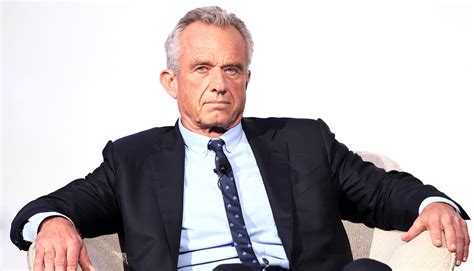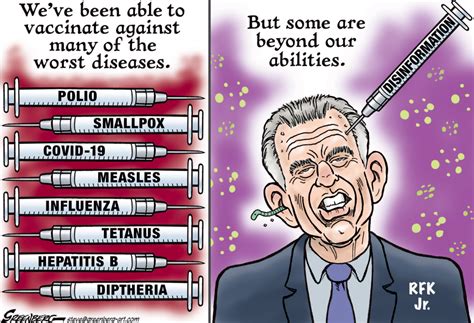
Robert F. Kennedy Jr.’s persistent dissemination of misinformation regarding vaccines has drawn sharp condemnation from medical professionals, who assert his statements are dangerous and demand an end to the propagation of falsehoods that undermine public health efforts.
A growing chorus of doctors and public health experts is vehemently denouncing Robert F. Kennedy Jr. for his continued peddling of vaccine misinformation, labeling his actions as not only reckless but also a significant threat to public health. They argue that his claims, often based on debunked theories and conspiracy narratives, erode public trust in established medical science and contribute to vaccine hesitancy, potentially reversing decades of progress in eradicating preventable diseases. The mounting frustration within the medical community has reached a boiling point, prompting many to speak out and actively counter Kennedy’s narrative with evidence-based facts.
Kennedy, who is running as an independent candidate for president, has a long history of making misleading and inaccurate statements about vaccines. His organization, Children’s Health Defense, has been a prominent platform for spreading anti-vaccine propaganda. Medical professionals are particularly concerned about the influence Kennedy’s views hold, given his family name and the potential for his message to resonate with a broad audience, regardless of its factual basis.
“Enough is enough,” stated Dr. Paul Offit, a renowned vaccine expert and director of the Vaccine Education Center at the Children’s Hospital of Philadelphia, in a recent interview. He and other experts express profound concern that Kennedy’s rhetoric actively jeopardizes public health. Offit, a long-time critic of Kennedy’s anti-vaccine stance, has consistently challenged his claims, citing rigorous scientific evidence that demonstrates the safety and efficacy of vaccines. He emphasizes that Kennedy’s pronouncements are not merely opinions but dangerous falsehoods that can have real-world consequences, including decreased vaccination rates and increased outbreaks of preventable diseases.
The criticism extends beyond individual doctors and encompasses major medical organizations. The American Academy of Pediatrics (AAP) and the Centers for Disease Control and Prevention (CDC) have both issued statements reaffirming the safety and importance of vaccines, directly contradicting Kennedy’s assertions. They highlight the rigorous testing and monitoring processes that vaccines undergo before being approved for public use and emphasize the overwhelming scientific consensus supporting their safety and effectiveness.
Kennedy’s claims often focus on alleged links between vaccines and autism, a theory that has been thoroughly debunked by numerous scientific studies. He also frequently cites the Vaccine Injury Compensation Program (VICP) as evidence of vaccine dangers, misinterpreting the program’s purpose and scope. The VICP is designed to provide compensation to individuals who have experienced rare but genuine adverse reactions to vaccines; however, Kennedy often uses it to suggest that vaccines are inherently dangerous and frequently cause serious harm.
The medical community argues that Kennedy’s misrepresentations of scientific data and his reliance on anecdotal evidence contribute to a climate of fear and distrust. They worry that his message will particularly resonate with parents who are already anxious about making informed decisions regarding their children’s health. The spread of vaccine misinformation can lead to delayed or declined vaccinations, leaving individuals and communities vulnerable to preventable diseases such as measles, mumps, rubella, and whooping cough. These diseases, once largely eradicated in the United States, have seen resurgences in recent years, often linked to areas with low vaccination rates.
“Vaccines are one of the greatest achievements of modern medicine,” asserts Dr. Anthony Fauci, former director of the National Institute of Allergy and Infectious Diseases (NIAID). “They have saved countless lives and dramatically reduced the burden of infectious diseases. To undermine public confidence in vaccines is to put lives at risk.” Fauci’s statement underscores the gravity of the situation and highlights the potential for Kennedy’s misinformation to undo decades of public health progress.
The fight against vaccine misinformation is not new, but experts say that Kennedy’s prominence and platform amplify the problem. His family name, coupled with the reach of social media, allows his message to spread rapidly and widely, making it difficult to counter effectively. Medical professionals are increasingly turning to social media platforms and public forums to debunk Kennedy’s claims and provide accurate information about vaccines. They are also urging social media companies to take a more active role in combating the spread of vaccine misinformation on their platforms.
Combating vaccine hesitancy requires a multifaceted approach, including clear and consistent communication from trusted sources, addressing concerns and answering questions with empathy and understanding, and promoting health literacy. Medical professionals emphasize the importance of building trust with patients and providing them with the information they need to make informed decisions about their health. They also stress the need for ongoing education and training for healthcare providers to ensure they are equipped to address vaccine-related questions and concerns.
The scientific consensus on vaccine safety and efficacy is overwhelming. Major medical organizations, including the World Health Organization (WHO) and the National Institutes of Health (NIH), have extensively reviewed the scientific literature and have concluded that vaccines are safe and effective. They continue to monitor vaccine safety and to conduct research to improve vaccine development and delivery. The medical community remains committed to protecting public health by promoting vaccination and combating misinformation. The rise of easily spreadable misinformation makes this task more important than ever.
The consequences of widespread vaccine hesitancy extend beyond individual health risks. Low vaccination rates can lead to outbreaks of preventable diseases, which can strain healthcare systems and disrupt communities. These outbreaks can also have significant economic impacts, as businesses and schools may be forced to close to prevent the spread of disease. Furthermore, vaccine-preventable diseases can disproportionately affect vulnerable populations, such as infants, the elderly, and individuals with compromised immune systems. Protecting these populations requires a high level of community immunity, which is achieved through widespread vaccination.
As Kennedy continues to spread his message, the medical community remains steadfast in its commitment to promoting evidence-based information and protecting public health. They urge the public to rely on credible sources of information, such as their healthcare providers and reputable medical organizations, and to be wary of misinformation spread through social media and other unreliable channels. The fight against vaccine misinformation is a critical battle in the ongoing effort to protect communities from preventable diseases and to ensure a healthier future for all.
The Roots of Kennedy’s Anti-Vaccine Stance and the Impact on Public Discourse
Robert F. Kennedy Jr.’s anti-vaccine activism is not a recent phenomenon; it has been a defining aspect of his public persona for nearly two decades. His involvement in the anti-vaccine movement began in the mid-2000s, initially focusing on the now-discredited link between vaccines and autism. Over time, his activism has expanded to encompass a broader range of claims about vaccine safety, efficacy, and government regulation.
Kennedy’s organization, Children’s Health Defense (CHD), has played a significant role in amplifying anti-vaccine messages and disseminating misinformation to a wide audience. CHD has been criticized for its use of misleading statistics, cherry-picked data, and conspiracy theories to promote its agenda. The organization has also been accused of exploiting parents’ fears and anxieties about vaccines to advance its own financial and political interests.
One of the key factors contributing to Kennedy’s influence is his family name. As a member of the Kennedy political dynasty, he enjoys a level of recognition and credibility that many other anti-vaccine activists lack. His association with a family known for its commitment to public service and social justice can lend an air of legitimacy to his views, even though those views are often at odds with mainstream scientific consensus.
Kennedy’s anti-vaccine activism has had a profound impact on public discourse about vaccines. His relentless promotion of misinformation has contributed to a climate of fear and distrust, making it more difficult for public health officials to communicate accurate information and encourage vaccination. His views have also been amplified by social media platforms, which have struggled to effectively combat the spread of vaccine misinformation.
The consequences of Kennedy’s activism have been felt in communities across the United States and around the world. Measles outbreaks, once rare, have become increasingly common in areas with low vaccination rates. These outbreaks not only pose a risk to individuals who are not vaccinated but also to vulnerable populations, such as infants and people with compromised immune systems.
The medical community has responded to Kennedy’s activism with a mixture of frustration and determination. Doctors and public health experts have consistently debunked his claims, citing rigorous scientific evidence that demonstrates the safety and efficacy of vaccines. They have also worked to educate the public about the importance of vaccination and to address concerns and anxieties about vaccines.
Combating the spread of vaccine misinformation requires a multifaceted approach. It involves not only debunking false claims but also building trust with communities and addressing the underlying factors that contribute to vaccine hesitancy. These factors can include lack of access to healthcare, cultural beliefs, and historical distrust of the medical system.
The fight against vaccine misinformation is an ongoing battle. As long as influential figures like Robert F. Kennedy Jr. continue to spread false information, the medical community must remain vigilant in its efforts to protect public health. This includes promoting evidence-based information, engaging in respectful dialogue with those who have concerns about vaccines, and advocating for policies that support vaccination.
The Role of Social Media in Amplifying Vaccine Misinformation
Social media platforms have become a primary battleground in the fight against vaccine misinformation. These platforms provide a convenient and efficient way for anti-vaccine activists to spread their message to a wide audience. The algorithms that govern social media often prioritize engagement over accuracy, which can inadvertently amplify misinformation and make it more likely to be seen by users.
Robert F. Kennedy Jr. and his organization, Children’s Health Defense, have been particularly adept at using social media to promote their anti-vaccine agenda. They have built a large following on platforms such as Facebook, Twitter, and Instagram, and they regularly post content that promotes misinformation about vaccines. Their posts often use emotionally charged language, misleading statistics, and conspiracy theories to sow doubt and fear about vaccines.
Social media companies have faced increasing pressure to address the problem of vaccine misinformation on their platforms. Some companies have taken steps to remove or flag content that violates their policies, but critics argue that these efforts are often too little, too late. They argue that social media companies need to do more to proactively combat the spread of misinformation and to ensure that users have access to accurate information about vaccines.
One of the challenges in combating vaccine misinformation on social media is the difficulty of distinguishing between legitimate concerns about vaccines and deliberate attempts to spread false information. Some people have genuine questions or anxieties about vaccines, and it is important to address these concerns with empathy and understanding. However, it is also important to be able to identify and remove content that is clearly false or misleading.
Another challenge is the fact that social media algorithms can create echo chambers, where users are only exposed to information that confirms their existing beliefs. This can make it difficult for people to encounter accurate information about vaccines, even if it is readily available.
To combat vaccine misinformation on social media, it is important to take a multi-pronged approach. This includes:
- Removing or flagging content that violates platform policies. Social media companies should have clear policies against the spread of vaccine misinformation, and they should enforce these policies consistently.
- Promoting accurate information about vaccines. Social media companies should partner with public health organizations and medical experts to provide users with access to accurate information about vaccines.
- Adjusting algorithms to prioritize accuracy over engagement. Social media algorithms should be designed to promote accurate information and to reduce the spread of misinformation.
- Educating users about how to identify and avoid misinformation. Social media companies should provide users with tools and resources to help them identify and avoid misinformation.
The fight against vaccine misinformation on social media is a critical part of the broader effort to protect public health. By taking these steps, social media companies can help to ensure that users have access to the accurate information they need to make informed decisions about their health.
The Legal and Ethical Implications of Spreading Vaccine Misinformation
The spread of vaccine misinformation raises a number of legal and ethical questions. One key question is whether individuals or organizations that spread misinformation should be held liable for the harm that it causes.
In the United States, there are legal protections for free speech, but these protections are not absolute. The government can restrict speech that is false, misleading, or harmful, especially when it poses a clear and present danger to public health.
Some legal scholars have argued that the spread of vaccine misinformation should be considered a form of defamation or product disparagement. Defamation is the act of making false statements that harm someone’s reputation. Product disparagement is the act of making false statements that harm the reputation of a product.
To succeed in a defamation or product disparagement lawsuit, the plaintiff must prove that the defendant made false statements, that the statements were published to a third party, and that the statements caused harm. In the case of vaccine misinformation, it could be difficult to prove that the misinformation directly caused harm to a specific individual. However, it could be argued that the misinformation caused harm to the public as a whole by undermining confidence in vaccines and contributing to outbreaks of preventable diseases.
In addition to legal considerations, there are also ethical considerations involved in the spread of vaccine misinformation. Many people believe that it is unethical to spread false or misleading information, especially when that information could put people’s health at risk.
Healthcare professionals have a particular ethical obligation to provide accurate information to their patients and to avoid spreading misinformation. The American Medical Association (AMA) has issued guidelines on the ethical responsibilities of physicians in the context of vaccine communication. These guidelines emphasize the importance of providing patients with evidence-based information, addressing their concerns and anxieties, and avoiding the use of scare tactics or misinformation.
Social media companies also have an ethical responsibility to combat the spread of vaccine misinformation on their platforms. They have a duty to protect their users from harm, and this includes protecting them from misinformation that could put their health at risk.
The legal and ethical implications of spreading vaccine misinformation are complex and evolving. As the spread of misinformation becomes more widespread and sophisticated, it is likely that these issues will continue to be debated and litigated.
The Future of Vaccine Advocacy and the Fight Against Misinformation
The fight against vaccine misinformation is likely to continue for the foreseeable future. As long as there are individuals and organizations that are willing to spread false or misleading information about vaccines, there will be a need for effective vaccine advocacy.
Vaccine advocacy involves promoting the benefits of vaccines and combating the spread of misinformation. It can take many forms, including:
- Educating the public about vaccines. This can involve providing accurate information about vaccine safety and efficacy, addressing common concerns and anxieties, and dispelling myths and misconceptions.
- Advocating for policies that support vaccination. This can involve supporting laws and regulations that require or encourage vaccination, such as school immunization requirements.
- Working with healthcare providers to promote vaccination. This can involve providing healthcare providers with the tools and resources they need to effectively communicate with their patients about vaccines.
- Combating the spread of misinformation on social media. This can involve reporting false or misleading content to social media companies and working with social media companies to develop strategies for combating misinformation.
Effective vaccine advocacy requires a multi-faceted approach that addresses the underlying factors that contribute to vaccine hesitancy. These factors can include lack of access to healthcare, cultural beliefs, and historical distrust of the medical system.
It is also important to build trust with communities and to engage in respectful dialogue with those who have concerns about vaccines. This involves listening to their concerns, addressing their questions, and providing them with accurate information in a way that is easy to understand.
The future of vaccine advocacy will likely involve the use of new technologies and strategies. For example, social media can be used to reach a wider audience with accurate information about vaccines. Artificial intelligence can be used to identify and remove misinformation from social media platforms.
The fight against vaccine misinformation is a critical part of the broader effort to protect public health. By working together, healthcare providers, public health officials, and community members can help to ensure that everyone has access to the accurate information they need to make informed decisions about their health.
Frequently Asked Questions (FAQs):
-
What are the main concerns doctors have about RFK Jr.’s statements on vaccines?
- Doctors are primarily concerned that RFK Jr.’s statements are misleading, inaccurate, and based on debunked theories, leading to vaccine hesitancy and putting public health at risk. They worry his high profile amplifies misinformation, reversing progress in eradicating preventable diseases.
-
What specific claims made by RFK Jr. regarding vaccines have been refuted by the scientific and medical community?
- RFK Jr.’s claims linking vaccines to autism have been thoroughly debunked by numerous scientific studies. He also misrepresents the Vaccine Injury Compensation Program (VICP) as evidence of vaccine dangers, although the VICP actually provides compensation for rare adverse reactions, not proof of widespread harm.
-
How are medical organizations and professionals combating vaccine misinformation, particularly that spread by RFK Jr.?
- Medical organizations like the AAP and the CDC issue statements reaffirming vaccine safety and efficacy, contrasting Kennedy’s assertions with evidence-based facts. Individual doctors actively debunk his claims on social media and in public forums, emphasizing the importance of relying on credible sources for health information.
-
What is the role of social media in amplifying vaccine misinformation, and what steps are being taken to address it?
- Social media platforms allow misinformation to spread rapidly, and algorithms can prioritize engagement over accuracy, amplifying false narratives. Social media companies are urged to remove or flag false content, promote accurate information, adjust algorithms, and educate users on identifying misinformation.
-
What are the potential consequences of widespread vaccine hesitancy driven by misinformation?
- Widespread vaccine hesitancy can lead to outbreaks of preventable diseases, straining healthcare systems, disrupting communities, and causing economic impacts through closures and reduced productivity. Vulnerable populations, such as infants and those with compromised immune systems, are particularly at risk.
Key People and Organizations Mentioned:
- Robert F. Kennedy Jr.: Independent presidential candidate and prominent figure known for spreading vaccine misinformation.
- Dr. Paul Offit: Vaccine expert and director of the Vaccine Education Center at the Children’s Hospital of Philadelphia, a vocal critic of Kennedy’s anti-vaccine stance.
- Dr. Anthony Fauci: Former director of the National Institute of Allergy and Infectious Diseases (NIAID), emphasizing the life-saving benefits of vaccines.
- American Academy of Pediatrics (AAP): A medical organization that has issued statements reaffirming the safety and importance of vaccines.
- Centers for Disease Control and Prevention (CDC): A U.S. government agency that provides information and recommendations about vaccines.
- Children’s Health Defense (CHD): Kennedy’s organization, which has been a platform for spreading anti-vaccine propaganda.
- World Health Organization (WHO): The directing and coordinating authority on international health within the United Nations system.
- National Institutes of Health (NIH): A part of the U.S. Department of Health and Human Services, is the nation’s medical research agency.
Further Context and Analysis:
The issue of vaccine misinformation is deeply intertwined with broader societal trends, including the decline of trust in institutions, the rise of social media, and the increasing polarization of political discourse. These factors have created a fertile ground for the spread of false information, making it more difficult for public health officials to communicate effectively and to promote vaccination.
Kennedy’s anti-vaccine activism can be seen as part of a larger trend of skepticism towards scientific expertise. This skepticism is often fueled by a distrust of authority and a belief that individuals are better equipped to make decisions about their own health. While it is important to respect individual autonomy, it is also important to recognize the value of scientific evidence and the expertise of healthcare professionals.
The medical community has a responsibility to address vaccine hesitancy by providing accurate information, engaging in respectful dialogue, and building trust with communities. This requires a commitment to transparency, empathy, and a willingness to listen to and address concerns.
The fight against vaccine misinformation is not just a medical issue; it is also a social and political issue. It requires a collective effort from healthcare providers, public health officials, social media companies, and community members to promote evidence-based information and to protect public health.
The rise of populism and anti-establishment sentiment has also contributed to the spread of vaccine misinformation. Kennedy’s message often resonates with individuals who feel alienated from mainstream institutions and who are looking for alternative explanations for complex issues.
Combating vaccine misinformation requires addressing the underlying factors that contribute to it. This includes addressing economic inequality, improving access to healthcare, and promoting health literacy. It also requires fostering critical thinking skills and encouraging people to rely on credible sources of information.
The legal landscape surrounding vaccine misinformation is constantly evolving. As the spread of misinformation becomes more sophisticated and widespread, it is likely that there will be increased pressure on governments and social media companies to take action to regulate it.
The future of vaccine advocacy will depend on the ability of healthcare providers, public health officials, and community members to adapt to the changing landscape of information and communication. This will require a commitment to innovation, collaboration, and a willingness to challenge misinformation wherever it is found.
The economic costs of vaccine hesitancy are significant. Outbreaks of preventable diseases can lead to increased healthcare costs, lost productivity, and decreased tourism. In addition, the cost of developing and distributing vaccines is substantial, and vaccine hesitancy can undermine the return on investment in vaccine research and development.
The ethical considerations surrounding vaccine mandates are complex. While mandates can be effective in increasing vaccination rates, they also raise concerns about individual autonomy and freedom of choice. It is important to strike a balance between protecting public health and respecting individual rights.
The impact of vaccine misinformation on vulnerable populations is particularly concerning. Individuals with compromised immune systems, infants, and the elderly are at higher risk of complications from vaccine-preventable diseases. It is important to ensure that these populations have access to vaccines and that they are protected from misinformation.
The role of media literacy in combating vaccine misinformation cannot be overstated. People need to be able to critically evaluate information, identify biases, and distinguish between credible and unreliable sources. Media literacy education should be integrated into school curricula and should be promoted through public health campaigns.
The effectiveness of different strategies for combating vaccine misinformation varies depending on the target audience and the context. It is important to tailor messages to specific communities and to use culturally appropriate language and imagery.
The long-term consequences of vaccine hesitancy are difficult to predict. However, it is clear that if vaccination rates continue to decline, the world will be at increased risk of outbreaks of preventable diseases. This could have devastating consequences for individuals, communities, and the global economy.
The responsibility for combating vaccine misinformation rests on all of us. We all have a role to play in promoting accurate information, engaging in respectful dialogue, and protecting public health.
The COVID-19 pandemic has highlighted the importance of vaccines and the dangers of misinformation. The rapid development and deployment of COVID-19 vaccines have saved countless lives and have helped to mitigate the impact of the pandemic. However, the spread of misinformation about COVID-19 vaccines has undermined public confidence and has made it more difficult to control the virus.
The lessons learned from the COVID-19 pandemic can be applied to the fight against vaccine misinformation more broadly. This includes the importance of clear and consistent communication, the need to address concerns and anxieties, and the value of building trust with communities.
The future of public health depends on our ability to overcome vaccine hesitancy and to ensure that everyone has access to the life-saving benefits of vaccination.
Conclusion:
The continued dissemination of vaccine misinformation by figures like Robert F. Kennedy Jr. poses a significant threat to public health. His claims, rooted in debunked theories and often amplified through social media, undermine public trust in established medical science and contribute to vaccine hesitancy. The medical community’s strong condemnation underscores the urgency of combating these falsehoods with evidence-based facts and promoting accurate information through trusted sources. Addressing this challenge requires a multifaceted approach involving healthcare providers, public health officials, social media companies, and community members, all working together to safeguard public health and ensure a healthier future for all. The fight against misinformation is not merely a medical issue; it is a social and political one that demands collective action and a commitment to truth and accuracy in public discourse.









